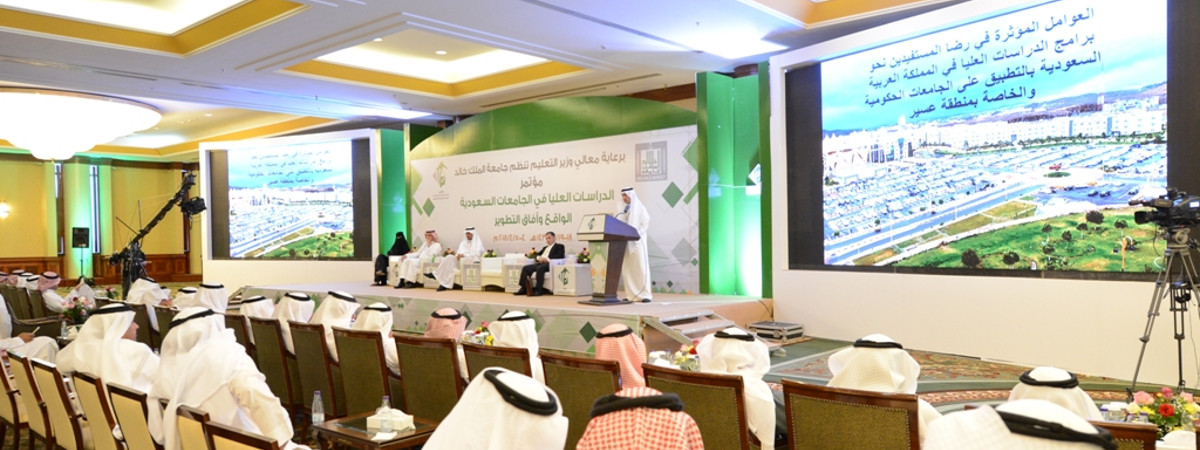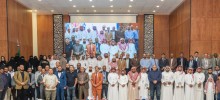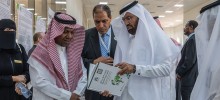Postgraduate Studies Conference Researchers Highlight Advances in Saudi Higher Education Programs

The first day of the Postgraduate Studies in Saudi Universities Conference organized by King Khalid University in Abha Palace Hotel hosted three sessions and 23 participants.
Dr. Sulaiman Al-Rumman chaired the first session that began with a presentation from Dr. Abdulrahman Al-Matrafi, Associate Professor in the Department of Literature and Linguistics at Imam Muhammad bin Saud Islamic University. He presented a paper that aimed to clarify the organization of theses in the fields of literature, literary criticism, eloquence: investigation and subject matter, ancient and contemporary literature, endoscopy and application, Arabic and other languages. The recommendations of the study linked current research presented by the department to the latest developments, theories, and methods suited to the university mission and its objectives.
Dr. Abdulaziz Al-Ammar, Professor in the Department of Rhetoric and Literary criticism at Imam Muhammad bin Saud Islamic University, highlighted the importance of being aware of research ethics and regulations and the impact they have on the preparation of a scientific thesis. He also addressed the obstacles and dangers of postgraduate students being ignorant of these regulations.
Researcher Amal Ahmed Al-Harbi, a specialist in the field of contemporary and ancient history from Umm Al-Qura University, presented a paper on the implementation of postgraduate studies and the sweeping impact it has on the university community and societal development. Her paper aimed to explain the most important active community engagement methods that should be applied and how Saudi universities can utilize them. She also covered the effectiveness of turning the proposed methods into reality through the use of modern techniques that keep pace with the rapid development of higher education systems.
King Saudi University's Rawi Al-Qahtani, Ph.D. in Social Work, and Saud Al-Dhahian, Professor of Social Work, presented a study entitled “Methodological Stereotyping in Scientific Theses: An Analytical Study on a Sample of Ph.D. Theses at King Saud University and Imam Muhammad bin Saud Islamic University." This study aimed to identify the extent to which postgraduate students' studies of the model methodology are utilized in their academic thesis through an examination of the shortcomings of these scientific theses and by answering questions pertaining to the validity of the methods used in the samples collected.
Taibah University's Dr. Taher Boutera, Associate Professor in the Department of Biology, unraveled the topic of plagiarism and the subsequent responsibility, reasons, and solutions. This paper aimed to present the standards of research writing and address the common pitfalls and mistakes made by researchers and graduate students.
Dr. Abdulaziz Al-Hajri chaired the second session and it began with a presentation by Dr. Saleh Al-Ghamdi, Deputy Executive Director of Institutional Accreditation at the National Center for Academic Accreditation and Assessment, who actively engaged with the audience on quality assurance and academic accreditation standards for graduate programs.
King Khalid University Vice Rector, Dr. Mohammed Al-Hassoun, chaired the third session, where Dr. Mahmood Fattouh, Professor in Psychology at Enaizah University, and Dr. Amina Badawi, Associate Professor in Nursing at Al-Jouf University, discussed the mechanisms for creating an encouraging academic environment for postgraduate students in Saudi universities. The paper proposed a number of results that included: (i) the need to organize academic tracks involved in postgraduate programs in Saudi universities, (ii) the modernization of university courses, and (iii) the need to publish innovative papers utilizing the latest research in the field.
King Saudi University's Dr. Bader Al-Otaibi, Professor of Philosophical and Social Assets, and Noura Al-Uweid, Lecturer at Prince Sattam University, discussed the policies of developing professional development programs for faculty members participating in graduate programs in Saudi universities in accord with Vision 2030. The objective of the research was to introduce professional development policies for faculty members who teach in postgraduate programs in Saudi universities by revealing the reality, requirements, and constraints of their professional development.
Dr. Shams Al-Khuwaiter reviewed the most important competencies required for professors of postgraduate studies in the field of humanities. She related that this can be completed through proper analysis of educational literature and identification of expertise in professional development within the proposed framework.
Dr. Nawal Al-Rashoud, Assistant Professor in Faculty of Education at Prince Sattam bin Abdulaziz University, presented her research piece entitled "The Reality of the Academic Environment at the Postgraduate Level and How to Develop It in the Light of the 2030 Vision." The main objective of the research, as she related, was to monitor the reality of the academic environment at the postgraduate level in Saudi universities and to identify accelerated development projects.
Following after, Dr. Abdul Latif Al-Hadithi, Associate Professor at King Khalid University and Dean of the Institute of Research and Studies, delivered an insightful presentation with a central theme on students' satisfaction with the quality of postgraduate programs in Saudi public and private universities. His recommendations were anchored to a marketing perspective that aims to identify the most important factors affecting the level of student satisfaction with the quality of services provided by universities and educational institutions in the field of postgraduate studies in the Asir Region.
Dr. Asmaa Salah, Assistant Professor of Pediatrics at Al-Jouf University, and Dr. Samiha Fathi, Lecturer in the Early Childhood Education at Al-Jouf University, discussed study plans and the need for regular revision.The research aimed to develop a vision and a proposed plan for postgraduate programs in the Early Childhood Education Department in accord with Vision 2030. The samples of the research were drawn from plans currently in place for postgraduate studies in the following universities: Ain Shams University, the University of Al-Isra in Jordan, and Al-Jouf University. The results of the survey succinctly proposed a plan for postgraduate programs in both the Early Childhood Education and Special Education Department.
University of Hail's Assistant Professor and Supervisor of Graduate Studies at the Department of the Arabic Language, Dr. Jazaa Al-Shammari, completed a paper on graduate studies and research projects. The objective of the research was to explain the reality of postgraduate studies in Saudi universities and Hail University as a model to reach the mechanisms of development and scientific research prospects through research plans and projects prepared by graduate students.
Ali Zalaa, a participant in the conference, delivered a presentation entitled "Prospects for Graduate Studies and the Non-Profit Sector in the 2030 Vision as a Model Project." He reviewed the role of the non-profit sector and the integrated relationship it has with educational establishments. He referred to the long-term outcomes that were uncovered at the First Scientific Researchers Meeting in Saudi Arabia that included hundreds of students from universities across the Kingdom. He indicated that the meeting developed a platform that led to the realization of a number of programs, services and projects. Overall, it aimed to actively engage in enhancing the level of graduate program outcomes through scientific research while finding a flexible and effective scientific system that contributes towards national development.
Dr. Ali Awad Al-Ghamdi, Ph.D. holder in Islamic Education, Ministry of Education in Taif, delivered a presentation entitled "The Role of Scientific Research in Postgraduate Studies in Saudi Universities in Achieving the 2030 Saudi Vision from the Views of Department Managers in the University." In his concluding remarks, he asserted the vital role that scientific research of postgraduate studies program will play in the in the Kingdom being an international hub of erudition.
King Khalid University's Assistant Professor of Education, Dr. Mohammed Ahmed Houaihi, presented a study entitled "A Proposed Concept for the Development of Postgraduate Educational Programs in King Khalid University using the Multi-Decision Model (CIP)". The study aimed at developing educational graduate programs at King Khalid University using the CIP model in accord with international academic accreditation criteria.
Dr. Ibrahim Al-Humaidhi, Professor in the Department of Sciences of Quran at Qassim University, presented a research paper entitled "The Effect of the Acceptance Criteria in the Quality of Postgraduate Studies." The purpose of this paper was to explain the impact of the admission criteria on the quality of postgraduate outcomes. They discussed a number of postgraduate requirements, the overall grade level for undergraduate students, the skills test for university graduates, the written acceptance test, the personal interview, and other pertinent criteria. The paper's results focused on the importance of the admission criteria that enhance the quality and outcomes of postgraduate studies.









